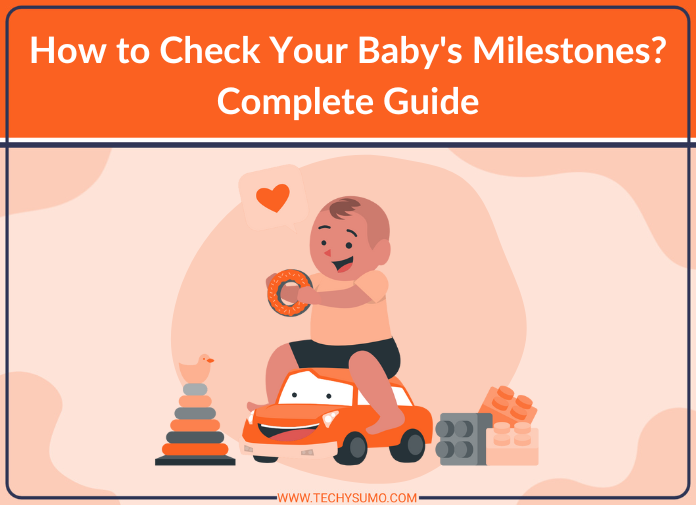Regular check-ups can ensure your baby is developing appropriately and effectively address any concerns about its growth and developmental stages.
Monitoring your baby’s development is crucial in order to know if your baby is on track in terms of growth and learning. Every child is unique and, therefore, grows differently, but some developmental milestones can be used to check on the progress of the baby. In order to check your baby’s milestones, it is advised to consult with a healthcare professional, like Dr Veena Kalra, the best paediatrician in Delhi. So, let’s discuss how to monitor your baby’s development and when to consult a doctor.
Table of Contents
Understanding Baby Milestones
Developmental milestones are significant events that show the child’s progress in different aspects, like motor, language, social, and cognitive domains. These milestones are grouped according to the child’s age and may slightly differ from one child to another. It is also important to track these milestones on a regular basis to notice any possible problems in time.
1. Motor Skills Milestones
Gross Motor Skills:
- 1-3 Months: At this stage, babies should be able to lift their heads when placed on their stomachs and kick and wave their legs and arms.
- 4-6 Months: Your baby should be able to roll over, sit with support and grab objects.
- 7-12 Months: Crawling, pulling up to stand, and possibly walking may be expected from the child.
Fine Motor Skills
- 1-3 Months: Babies should be able to hold objects that are placed in their hands.
- 4-6 Months: They will start to pick and hold objects, such as toys, with better dexterity.
- 7-12 Months: They should be able to grasp objects using the thumb and the index finger and manipulate objects with their hands.
2. Language Development Milestones
Early Sounds
- 1-3 Months: Your baby will coo, gurgle, vocalize, and respond to voices that he or she recognizes.
- 4-6 Months: They should start speaking in simple syllables that are made up of a consonant followed by a vowel, such as ‘ba-ba’ or ‘da-da’.
- 7-12 Months: Search for the use of basic vocabulary and the greater number of different phonemes. They may also comprehend simple words, such as “no” and “bye-bye.”
3. Social and Emotional Milestones
Interaction and Play
- 1-3 Months: Babies will begin to smile at other people and engage with faces.
- 4-6 Months: They will like to play with other children and may develop some sort of fear when they meet different people.
- 7-12 Months: Search for more demonstrative social behaviors like clapping, waving, and reaching out for people or objects that the child likes.
4. Cognitive Development Milestones
Exploration and Problem-solving
- 1-3 Months: Toddlers will move around by crawling and will grab things and look around.
- 4-6 Months: They should begin to grasp the concept of cause and effect, for example, shaking a rattle to make a sound.
- 7-12 Months: It is expected that problem-solving skills will emerge, for instance, when the child is searching for an object that has been hidden and when the child is following simple commands.
When to Seek Professional Advice
However, these milestones should be taken as a general guide because every baby is different. If you find delays or no progress at all, then it may be wise to consult a professional. It is always helpful to consult a pediatrician to get reassurance and to have all your questions answered.
Guidelines on How to Track Your Baby’s Development
- Keep a Developmental Diary: Writing down your baby’s activities in a diary is also useful for monitoring his or her development and during appointments with the pediatrician.
- Use Checklists: Many parents find milestone checklists useful for systematic observation of their baby’s development. Checklists from reliable sources can be found online for pediatricians and parents to monitor different aspects.
- Engage in Regular Activities: Encourage your baby’s development by doing activities that will help him or her to develop motor skills, language, and thinking skills. Basic functions, such as reading, playing with toys, and even talking to family members, can help in developmental advancement.
- Attend Regular Check-ups: It is important to take your baby to a pediatrician, like
Dr Veena Kalra, for check-ups to ensure that the development of the baby is on track and any problems are caught early.
Also Read
Conclusion
Monitoring your baby’s development is a crucial aspect of the growth of your child. These are the milestones that you should be aware of and keep track of so that you can help your baby develop properly and without any problems. It is always helpful to seek advice from a specialist like Dr. Veena Kalra, the best pediatrician in Delhi, to help you through your baby’s developmental stage. As you have seen, milestones provide a guide to what should be expected at a given age, but every child is different, and one size does not fit all.






